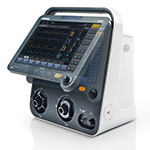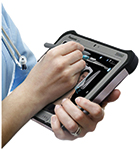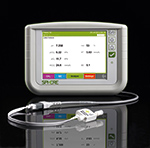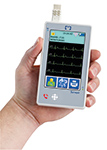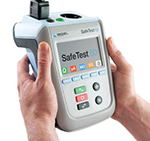ICU ventilator
Mindray’s SV 300 is a turbine-driven ICU ventilator with excellent ICU transport capability. The newest member of Mindray’s SynoVent ventilator portfolio features a series of basic and advanced ventilation modes and functions, including IntelliCycleTM in Pressure Support, and (optional) mainstream volumetric CO2 monitoring. Its built-in turbine generates flows of up to 210 l/min and pressures of up to 80 cmH2O. Patented Expiration and Inspiration Valve technology provides excellent protection of flow sensors, and both valves can be autoclaved, as per CE guideline ISO 80601-2-12 and -55. Weighing less than 10 kg, it has Li-Ion batteries that provide up to 4 hours of independent work, and O2 supply can be high or low pressure, including oxygenators.
Read more

